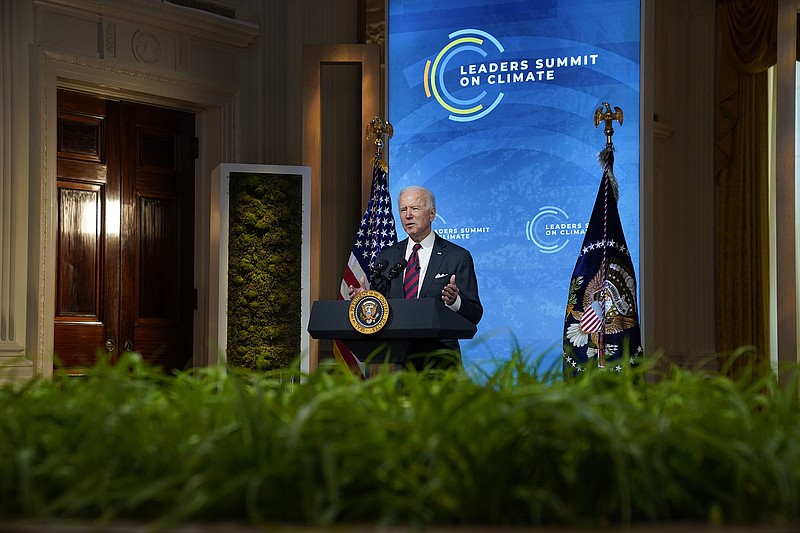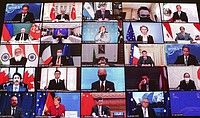WASHINGTON -- President Joe Biden on Thursday moved to put four years of official climate denial behind the United States, declaring that America would cut its global-warming emissions at least in half by the end of the decade.
"The science is undeniable," Biden said.
Addressing 40 heads of state at the start of a virtual two-day summit meeting to prove the United States' commitment to the Paris climate agreement, which former President Donald Trump abandoned, Biden sought to galvanize other countries to take more aggressive steps. He cast the challenge of avoiding catastrophic warming as an economic opportunity for America and the world.
"This is a moral imperative, an economic imperative," Biden said. "A moment of peril, but also a moment of extraordinary possibilities."
In rapid succession, Japan, Canada, Britain and the European Union committed to steeper cuts. But China, India and Russia made no new emissions promises, and even Biden's commitment to cut U.S. greenhouse gases 50% to 52% below 2005 levels by the end of the decade will be extraordinarily difficult to meet, economically and politically.
[Video not showing up above? Click here to watch » https://www.youtube.com/watch?v=_4rlVVLiWDY]
Energy experts said it would require a dramatic overhaul of American society, including the virtual elimination of coal for electricity and the replacement of millions of gasoline-powered cars with electric vehicles.
And the Biden administration's ambitions cut to the heart of its toughest diplomatic challenge: China. While the United States is the largest emitter in history, China's emissions are currently the largest, only adding to the issues that have both Republicans and Democrats seething at Beijing.
Republicans immediately questioned why Americans should sacrifice when Chinese coal pollution is likely to swamp any gains from U.S. emissions cuts, at least in the near term.
Sen. Mitch McConnell, the Republican leader, said Thursday that China has "shamelessly" kept emitting more. "Their share of greenhouse gas emissions are now nearly double that of the United States," he said.
And McConnell dismissed the administration's plans as costly and ineffective. "This is quite the one-two punch," he said in a Senate speech. "Toothless requests of our foreign adversaries ... and maximum pain for American citizens."
Patrick Morrisey, attorney general of West Virginia -- the second-largest coal producer in the nation after Wyoming -- called it a "radical" plan and a "domestic and foreign policy blunder of almost unfathomable proportions."
The stakes are enormous, for Biden and for the planet. If nations fail to keep global temperatures from rising more than 1.5 degrees Celsius -- the equivalent of 34.7 degrees Fahrenheit -- above preindustrial levels, the world economy will suffer $23 trillion in losses by midcentury from natural disasters and the spread of disease, according to a report from Swiss Re, one of the world's largest providers of insurance to other insurance companies.
American credibility has been battered by years of joining and then abandoning efforts to tackle climate change; if it does not meet its new goals, or if it reverses course once again with a new administration, trust in the United States would plunge still further.
The latest pledge puts the United States almost on par with Europe, but still behind Britain.
"This is not bunny-hugging," British Prime Minister Boris Johnson said. "This is about growth and jobs."
AID PLEDGED
On climate finance, the Biden administration promised to double its contribution to help developing countries address climate change, to an estimated $5.7 billion by 2024.
But, like many of Biden's promises, that would require the approval of Congress. And even that level would only match what many other rich countries did years ago. Experts said the finance announcement was anything but ambitious.
John Kerry, Biden's global climate envoy, said changes in the marketplace were happening so quickly that, he believes, the United States will not just meet but surpass its new goal.
"It's not easy," he said. "Is it doable? Yes. Will we probably exceed it? I expect yes."
To overcome domestic opposition, Biden will have to bring the world along, especially China. Several major industrialized nations did announce aggressive new goals at the summit.
Prime Minister Yoshihide Suga of Japan raised his country's target for cutting emissions to 46% from 2013 levels by the end of the decade, up from 26%, and in a last-minute surprise said the country would "continue to try for an even higher cut" of 50%. The Biden administration had exerted strong pressure on Japan to announce a 50% goal.
Prime Minister Justin Trudeau of Canada raised his country's goal to a cut of 40% to 45% from 2005 levels, up from 30%. President Moon Jae-in of South Korea announced an end to public finance for coal-fired power plants overseas.
[Gallery not loading above? Click here for more photos » arkansasonline.com/423climate/]
Even President Jair Bolsonaro of Brazil, an ally of Trump's who has denied the science of climate change in the past, vowed to end illegal deforestation by 2030 despite having overseen the sharpest rise in the destruction of the Amazon in 12 years.
Longtime climate policy experts, no strangers to summits with solemn pledges, watched speeches such as Bolsonaro's with skepticism. After he promised an end to clear-cutting, Dan Wilkinson of Human Rights Watch's environmental programs said, "It is going to be hard for anyone to take it seriously until they actually start taking steps."
President Xi Jinping did pledge that China would "strictly limit increasing coal consumption" in the next five years and phase it down in the following five years. That could prove significant, as China is by far the world's largest consumer of coal -- the dirtiest fossil fuel -- and is continuing to expand its fleet of coal-fired power plants.
"To protect the environment is to protect productivity, and to boost the environment is to boost productivity. It's as simple as that," Xi said.
Xi also repeated his pledge from last year to draw down carbon emissions to net zero by 2060. In a pointed reminder to his host, he said the industrialized countries had a responsibility to act faster to reduce emissions.
But the United States cannot tame climate change alone, Biden stressed. America accounts for about 15% of global emissions, a point made repeatedly by the president, Kerry and Secretary of State Antony Blinken.
"All of us, and particularly those of us that represent the world's largest economies, we have to step up," Biden said.
MORE EXPECTED
Some climate activists, particularly from poorer countries that have polluted the least but are suffering the worst consequences of climate change, said the United States was obligated to do far more.
"This summit is a major turning point that now shifts attention toward the laggards and concrete near-term actions," said Mohamed Adow, director of Power Shift Africa, a research organization based in Nairobi, Kenya. Rich, polluting countries, he said, "need to come back with much stronger pledges, including climate finance for poorer nations."
Leaders of smaller states and island nations buffeted by rising seas and worsening hurricanes also appealed for aid and fast emissions cuts from world powers.
"We are the least contributors to greenhouse gas emissions, but the most affected by climate change," said Gaston Alfonso Browne, prime minister of Antigua and Barbuda. He called for debt relief and more international assistance to recover from storms and the pandemic to prevent a flow of climate refugees. His people he said, are "teetering on the edge of despair."
President Vladimir Putin said, "Russia is genuinely interested in galvanizing international cooperation so as to look further for effective solutions to climate change as well as to all other vital challenges." By some measures, his country is the world's fourth-biggest emitter of fossil fuel fumes.
Leaders expressed open relief at working with an American administration that embraces science and again acts as part of the global community.
"The Paris agreement is humanity's life insurance," said Ursula von der Leyen, head of the European Commission. "It is so good to have the U.S. back on our side."
German Chancellor Angela Merkel agreed: "I'm delighted to see that the United States is back, is back to work together with us in climate politics. Because there can be no doubt about the world needing your contribution if we really want to fulfill our ambitious goals."
Pope Francis contributed a video from the Vatican, saying, "I wish you success in this beautiful decision to meet, walk together going forward, and I am with you all the way."
Information for this article was contributed by Lisa Friedman, Somini Sengupta and Coral Davenport of The New York Times; and by Ellen Knickmeyer, Matthew Daly, Christina Larson, Ashok Sharma, Joe McDonald, Vladimir Isachenkov, David Biller, Nicole Winfield, Mari Yamaguchi, Aamer Madhani, Seth Borenstein, Lisa Mascaro and Alexandra Jaffe of The Associated Press.


